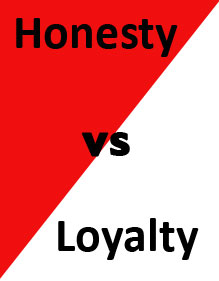|
Getting your Trinity Audio player ready...
|
 By Janine Erasmus
By Janine Erasmus
Part one of our series defined the practises of nepotism, cronyism, patronage and cadre deployment, and discussed their effect on the ethics culture generally.
In the second and final part we deal with the dilemma of loyalty vs honesty, and explain why appointing unsuitable people can end up costing a lot of money.
Loyalty vs honesty
In the political sphere those appointed to top positions will often have some form of appropriate qualification, but further down the ladder, there’s a greater chance of someone’s relative or friend being given a position they are not qualified to hold.
In the recruitment arena, these relationships can be the basis for a difficult problem. The question of whether to be honest or loyal – when you have to choose between right and right – poses a major ethical dilemma, says Cynthia Schoeman, MD of Ethics Monitor, because a morally right argument could be made for either choice.
“Both are good values. In a scenario where people have shared an extraordinary experience, such as the years of the struggle, how do you tell on your comrade when you see them pinching the petty cash, so to speak? Loyalty is a part of what you stand for.”
So when that comrade comes to you and asks for a job or other benefit, are you driven by honesty or loyalty, Schoeman asks. “I don’t raise this issue as an excuse, but rather as a recognition that in our specific national situation, the person offering the benefit often grapples with this dilemma.”
Understanding of the tug-of-war between the two forces can aid decision-making, although it doesn’t make it easier. “It will help if you step back and say that, long-term comrade notwithstanding, my responsibility now goes beyond this relationship – to the department, my role in society, the country. That will bring clarity."
So in this case, honesty is the virtue that should come up trumps.
There’s room for a greater ethics dialogue to help overcome these challenges, says Schoeman. Debating the issue, perhaps in a shorter time than a formal workshop (which also has its place) but more frequently, will give people the chance to explore the issue and build ethical fitness by reinforcing the message on a sustained basis.
Biting the hand that feeds
Sometimes cadre deployment backfires – we only have to think of Andrew Feinstein or Thuli Madonsela. These people, who were put in positions of leadership because of their sterling records in the party, went against expectations by speaking out against misdemeanours – in Madonsela’s case, by doing the job she was hired to do, while Feinstein resigned from the ANC and became one of the arms deal’s most vocal critics.
In August newspapers reported that public protector Madonsela was asked to investigate the appointment of President Jacob Zuma’s 25-year-old daughter to a top position – chief of staff – in the telecommunications department. Thuthukile Zuma has an honours degree in anthropology and according to the department, her “genealogy was never a consideration”.
The person who complained to the public protector had asked for an investigation into the recruitment process, to ensure that all processes were followed correctly.
“Even though she is degreed, she has minimal work experience and if you take away the ‘Zuma’, would she even have been interviewed for that position?” postulates Schoeman.
The Public Service Commission (PSC) is also looking into the matter, following another complaint. While the younger Zuma’s supporters have defended her appointment as political and therefore not requiring qualifications, the PSC says that on the contrary, a chief of staff is one of the key people who helps the minister fulfil his or her mandate, and must have “the minimum, essential management, administrative, liaison and interpersonal relations competencies”.
This information was contained in a PSC report on the appointment of ministerial staff, according to the Mail & Guardian.
An expensive exercise
Not only are the beneficiaries of this type of corruption often ineffective, but they can cost the taxpayer huge sums of money when consultants have to be called in to do the work someone is already being paid to do. In his 2012-2013 audit report, released in July 2014, auditor-general Kimi Makwetu named “key positions vacant or key officials lacking appropriate competencies” as one of three root causes of poor audits.
“The poor audit outcomes, service delivery failures, high demand for consultants (as detailed in section 3.3.2) and support from national and provincial governments demonstrate that persons appointed in these posts do not always have the required competencies.”
In the audit period government departments spent an estimated R1.9-billion on consultants. Makwetu’s is not the first AG report to point this out. He also noted that despite bringing these consultants in, the audit documents submitted still contained errors.
“This is despite the fact that most municipalities used consultants (external service providers) to assist with the preparation of financial statements … in many cases, this spending on external service providers was over and above the fixed cost of employment paid to those that are employed to fulfil financial management and reporting responsibilities.”
Makwetu added that municipalities must build proper capacity – which includes following proper recruitment procedures – to maintain an adequate standard of governance.






